
VOL. II NO. 11 REG NO. L5015 DELHI, FRIDAY NOVEMBER 26, 1943
BOMBERS MAINTAIN PACE IN BURMA
The 10th Air Force continued to pound Burma this week, but also extended its activities to take a whack at Thailand when B-24 Liberators, on Nov. 20, attacked the airdromes at Chiengmai and Lampang, both important rail communications centers, 60 and 155 miles, respectively, from the Burma border.
At Chiengmai, 170 miles due east of Toungoo, 12 tons of demolition bombs crashed on the target. A number of airplanes were destroyed on the ground and several fires resulted in explosions. At Lampang, 45 miles southeast of Chiengmai, fires and explosions followed hits on the runway and adjacent revetment area. Seven and a half tons of
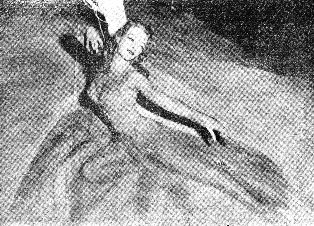 Those flimsy-robed curves (woo-woo) belong to dancer Vera Zorina, who fortunately for the Roundup, knows
there is a time and place for wearing this type of apparel.
Those flimsy-robed curves (woo-woo) belong to dancer Vera Zorina, who fortunately for the Roundup, knows
there is a time and place for wearing this type of apparel.
|
The same day, another 7½ tons of bombs were loosed on the river port and rail center of Prome, in southern Burma, causing large fires and two violent explosions. This was followed by a "reminder" raid on the port of Akyab and at Kyaukpyu on Ramree Island.
In northern Burma, medium and fighter-bombers quickened the pace of their bombing and strafing attacks on enemy communications. Flying over a string of rail towns southwest of Katha on Nov. 18, they damaged or destroyed bridges, locomotives, box cars and track.
On the 19th, fighter-bombers wrecked the Namkwin railroad bridge and damaged a road bridge at Mogaung Ga, between Kamaing and Manywet. Warehouses, tracks and rolling stock were hit at Namti, six miles northeast of Mogaung, causing several fires and a large explosion.
Ground operations in the Hukawng Valley were actively supported by fighter-bombers. Near Taring Ga, on Nov. 19, bombs were reported to have hit the middle of an enemy concentration massing for a river crossing, inflicting many casualties. In the taro area, supply rafts were strafed on the Tanai River. Another formation bombed a highroad bridge at Tiangzup, 42 miles north of Myitkyina. With both ends down, the bridge is now unserviceable.
In the area from Shadazup to Maingkwan, several hits by demolition bombs caused fires and dense smoke. Other objectives north of Taipha Ga were attacked from low altitude and several fires were started by incendiaries.
From all these operations, all planes returned to base.
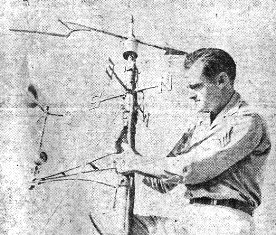 This group of gadgets with which Sgt. R. E. Lucas is fiddling here may look like a new Rube Goldberg invention,
but, honest, it ain't. Lucas is taking a wind reading atop an air field operation observation tower at an Air
Service Command air depot in India. He plots weather maps, charts sky conditions and takes atmospheric pressure and
temperatures to provide important data for all Allied aircraft in the Theater. The station is equipped with the
finest possible Army Air Force weather instruments.
This group of gadgets with which Sgt. R. E. Lucas is fiddling here may look like a new Rube Goldberg invention,
but, honest, it ain't. Lucas is taking a wind reading atop an air field operation observation tower at an Air
Service Command air depot in India. He plots weather maps, charts sky conditions and takes atmospheric pressure and
temperatures to provide important data for all Allied aircraft in the Theater. The station is equipped with the
finest possible Army Air Force weather instruments.
|
SECOND ANNIVERSARY
OF OVERSEAS DUTY
ADVANCED BOMBER BASE - Members of this unit recently celebrated an anniversary which few, if any, units in the entire United States Army can match - the second anniversary of its sailing from the home shores through the Golden Gate to take up combat stations in an embattled world which had not yet experienced Pearl Harbor.
Nov. 21, 1941, was the date on which the unit, then 2,000 strong, marched up the gangplank of an Army transport. Now death, sickness and transfer have cut so deeply into the ranks that only 400 of the original 2,000 remain. But, in starting their third year of war, those who remain have a proud record to look back on, as one citation, a recommendation for another and a shower of individual medals and citations amply attest.
in fact, members of the unit claim to have been the first Americans to fight on three major fronts. Their first assignment was the suicidal attempt to beat back the Jap in Java. Next, they were rushed to India to hammer him in Burma. An emergency call came from North Africa where Rommel was lunging forward toward Cairo, and units of the group were thrown into the great offensive of El Alamein. Back in this Theater, they are now continuing to paste the Japs in a manner which has become second nature to them, and are helping in the job of making Tojo regret he ever heard of Pearl Harbor.
The spirit of the unit also has been transmitted to many other outfits, for most of those who have been transferred have assumed key positions in other units, where their battle experience could help to train and shape newer flyers.
JUNGLE SHANGRI-LA FOR G.I.'S
AIRPLANE SALVAGERS EARN REWARD OF EPICUREAN FEAST
SOMEWHERE IN INDIA - Ice cream and cake, shortcake made with pears, fresh milk and vegetables, homemade sweet butter, iced lemonade, fried eggs, sausages and hot biscuits - this is surprising fare to be encountered anywhere in India, but it is particularly surprising to be found in the heart of a steaming jungle.
Nevertheless, that is exactly what
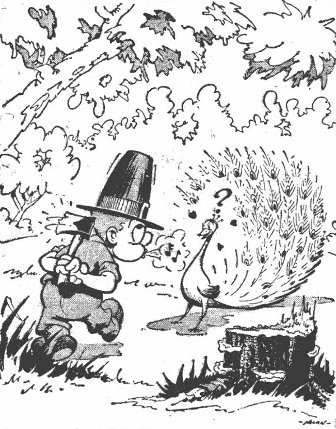
|
JOB SEEMED EASY
It happened on a trip the two took recently after a plane wreck had been reported to this ASC base. Moran and Kain were given the job of going out to see what could be salvaged from the wrecked ship, which didn't seem much of an assignment because they had a jeep and the plane was only 30 miles away.
Or so they thought. But they knew differently when they arrived at the ford across the first stream which lay across their path. It was flooded by rains, and the ford was unusable. So, being nobody to argue with Fate, the two retraced their steps to the point from which they started, loaded their jeep into a railroad car and started out all over again.
CHARTERED BUS
The train took them and the jeep to a point on the river where there was a boat landing. Here the jeep had to be abandoned, and local talent paddled them merrily down the stream in an Indian boat to another landing. Here and ancient international bus was chartered, which took them to a jungle village where, to their surprise, the two Americans discovered a flourishing American mission.
It was the missionaries who wined and dined them in a manner to which they have long been unaccustomed, and then the two made a 66-mile round trip through the jungles to the plane. Salvaging what they could and bringing the parts out on the backs of bearers, they finally made their way back to their base - after having traveled more than 200 miles to cover 30.
Just Dog's Life For Chota-Peg (The story of Chota-Peg as told to photographer Cpl. James G. Doyle.)
CENTRAL INDIA AIR DEPOT - "O.K., soldier, if you want my story, but let's make it short, because this perch isn't too comfortable.
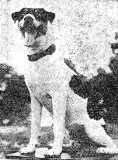
|
"I was raised in a city in the southern part of the States and doing all right for myself. I had my favorite hydrants, knew where the best garbage cans were and was able to get around.
"And then I struck up an acquaintance with some of your fellows. They seemed first class and treated me like a blue blood who knew who his father was. Then suddenly it happened! I was on a big four-engine job headed across the Atlantic. We stopped at several places, but not long enough to get acquainted. Some day I'm going back to meet some of those little tan numbers. The boys stayed at this base a little longer than usual, but I was left behind. I know the reason and can't blame them . I'm 'bungalow broke,' but there's a limit to even a dog's endurance and those relief tubes are not installed for canines. Even some of the crew seemed to have their troubles.
"India is all right, but I'll still take the United States. I've tried to get oriented but it just ain't possible. These mutts running loose. Always growling at each other and I haven't seen a good fight yet.
"And the hydrants - did you ever see anything like them? You can't get close, because people are taking baths. Men wearing skirts, women hiding their ankles and their faces and cattle that won't budge when you yip at them.
"Well, as I said, It's all right if you like it, bust listen, pardner, do you suppose there is any truth in the rumor that we might go home?"

|
EAST INDIA BASE - Lt. Robert L. Martin is another pilot of the 10th Air Force who has looked death in the face and audaciously thumbed his nose.
Not long ago, Martin's engine conked out while the photo reconnaissance pilot was on a routine mission over Burma. When the engine burst into flames, burning the cowling off, he decided that this was where he came in, and hit the chute at 6,000 feet.
Which was all right, except that he came down between two trees in the jungle and found himself suspended 25 feet above the bamboo thicket. First he tried to swing to one tree or the other, but failed. Then he unbuckled his chute, intending to drop into the thicket below, but his left ankle caught in the cords and left him hanging, head down, 50 feet above the ground.
"I couldn't lift myself far enough to catch the chute straps and pull myself up," martin said. "So I fired my pistol five times, hoping someone was close enough to hear. Luckily for me, 10 men from a local tribe soon arrived and shook me down."
Unable to understand Martin's tongue, the tribesmen nevertheless realized what the situation was and helped him to a nearby village. A trip down a river on a bamboo raft then brought him to a missionary hospital, where burns, received from the flames of the engine, were treated. Eventually, Martin was transferred to a U.S. Army hospital.
Turns In The Top Sergeant
HOLBACK EVENS SCORE - FAVORITE PIN-UP BOY
AMERICAN AIR COMMAND NO. 1 HQ - The boy who stopped the show this week up in Assam was Pvt. (sometimes Cpl.) Julian P. (The Smudge) Holback, who lives all alone in his little grass shack with a petty arsenal of submachine guns, rifles and enough assorted ordnance to reproduce the Siege of Stalingrad, complete with all sound effects. As

|
Not long ago, however, an errant machine gun stayed out all night in its dewey pit, which cost its keeper two chevrons and his Army-Navy "E" pennant. Later, 1st/Sgt. George J. Bous, who does his duty as he sees it, chided our boy about another gun, whose barrel looked like a clogged sewer, and Julian's cup of woe brimmed full.
Undismayed, Julian promptly conducted his own private "inspection arms" and came up with a grin like the cat that has just devoured dicky-bird. Going straightaway to the No. 1 gun-officer-walla, he reported that, much to his sorrow, a certain automatic weapon assigned for maintenance to the first sergeant was in dreadful shape. The incident is now happily forgotten, but Julian P., as the only private on record to turn in the first sergeant, has become the favorite pin-up boy of us jungle youngsters.
Here on the frontier, stranger, where a man's worth is reckoned by what he kin do with a shootin' iron, Capt. Theodore (Diamond Dick) Kuyper is tops. His reputation springs from a recent trip he took around the area with a distinguished lieutenant colonel of the British Army, in the course of which the two came unexpectedly upon a poisonous snake known as the Krait. The snake ignored them, did not snap to attention, indeed was pretty lethargic about the whole thing, so the colonel mischievously prodded him with his stick.
Then the krait got nasty and started to wind up like Morton Cooper, whereupon the colonel, veddy coolly standing his ground, bet Kuyper a rupee he couldn't shoot off the reptile's head with his .45.
As the snake prepared to strike, the captain whipped out his trusty automatic (this should really be continued until next week) and pulverized him with one shot. Denouement: The colonel paid off, with pleasure.
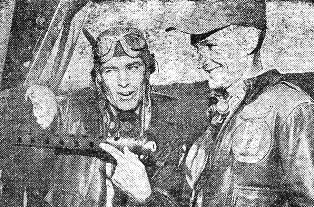 When it comes to knocking Japs out of the skies, there are few persons any superior to S/Sgt. Arthur J. Benko, left,
who mans a top turret gun on a 14th Air Force B-24. Benko, who here explains to Lt. Samuel J. Skousen how he dood it,
has sent 16 enemy planes to flaming oblivion from China's skies.
When it comes to knocking Japs out of the skies, there are few persons any superior to S/Sgt. Arthur J. Benko, left,
who mans a top turret gun on a 14th Air Force B-24. Benko, who here explains to Lt. Samuel J. Skousen how he dood it,
has sent 16 enemy planes to flaming oblivion from China's skies.
|
XMAS GIFT FROM 'OVERAGE DESTROYER'
Leslie H. Fowler, an "overage destroyer" who was sent home after serving four months in C.B.I. because he is well over 40, is a guy who didn't forget his former buddies when a certain crispness in the air in Oregon recently reminded him that Christmas was on the way.
Unable to get away from the Salem cannery, in which he is now working seven days a week, for Christmas shopping, Fowler sent a letter to his former commanding officer, Maj. Charles T. Holmes, in which he enclosed a $10 bill and requested the major to see to it that the money was spent "to buy something that would make their (his former comrades) Christmas a little more pleasant than it would have been."
So impressed was Holmes by this act of civilian thoughtfulness that he brought the donation to the attention of Maj. Gen. George E. Stratemeyer, who decided the matter was important enough to deserve a reply from the Commanding General, USAAF in C.B.I., himself.
"You have my personal thanks, as well as those of the men with whom you formerly served, for your thoughtfulness," wrote the general. "The money will be spent exactly as you intended it should be."
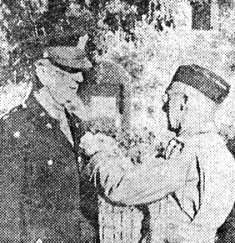
|
D. S. Awarded Wedemeyer
Maj. Gen. Albert C. Wedemeyer, deputy chief of staff to Lord Louis Mountbatten, Supreme Allied Commander of SEAC, was presented the Distinguished Service Medal by Lt. Gen. Joseph W. Stilwell, commander of U.S. Army Forces in the CBI Theater.
The high award was made, according to the citation, for Wedemeyer's "Exceptionally meritorious and distinguished service in a position of great responsibility as Chief of the Strategy Section and subsequently as Chief of the Strategy and Policy Group, Operations Division, War Department General Staff, and as the War Department representative with the Joint and Combined Staff planners."
LEGION OF MERIT AWARDED
SERGEANT HANDLES DANGEROUS MUNITIONS
The Legion of Merit was this week awarded to a G.I. of the C.B.I. Theater for outstanding devotion to duty in the face of great danger.
The G.I., Sgt. James M. Douglas, of Bloomington, Ind., was in charge of a munition shipment which was damaged en route. At great danger to himself and in spite of injuries, he personally removed the most dangerous damaged items and disposed of them in a way that prevented civilian casualties. He refused any but first aid treatment for his injuries and continued with the remainder of the shipment until it reached its proper destination.
The award was made at the direction of the President and by command of Lt. Gen. Joseph W. Stilwell.
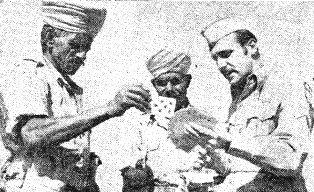
|
Instead, He's Showing
AIR SERVICE COMMAND BASE - Pfc. Al Weiner, who has been know as "Aldini the Magician" for 15 years, is disappointed in Indian mystics. He came her to be shown - but, as the picture indicates, he is showing instead.
Weiner's position as a clerk has given him an opportunity to study the methods of Indian magicians closely, but he has discovered nothing which is not known in the States. Even an investigation of the "rope trick" had produced only the conclusion it is a fable concocted for tourists. However, he has found the average Indian magician to be clever in sleight-of-hand and manipulation.
Weiner originally started to study art in Chicago. One of his early assignments, however, was the sketching of Blackstone's famous hands. The great magician showed Al a few simple tricks, the art course was forgotten and he made his living thereafter as a magician in Hollywood and Chicago.
He is still amusing people at Red Cross shows and Special Service entertainments.
P.S. - he has yet to receive an invitation from his fellow G.I.'s to join them in a poker game.
|
SWEEP SEAS; STRAFE, SINK SHIPS
CHINA - (Delayed) - A group of 14th Air Force bomber pilots in this alphabet-conscious war have been christened by G.I.'s as "Chennault's Sad SAACs."
Named the "Submarine Aerial Auxiliary Corps" for their exploits in sinking Jap sinking along the China coast and on the Yangtze River, the SAACs are composed of members of the "Sky Dragons," a medium bombardment squadron commanded by Lt. Col. Morris F. Taber.
Since the latter part of September, they have sunk 21,200 tons of Jap shipping and probably 12,300 more. (This figure goes only as far as Nov. 6. They've since improved upon it.)
"Saddest SAAC" is Lt. George F. Grottle, who leads the field with 12,500 tons confirmed and 1,000 tons probable. His tonnage soared Nov. 4 when he sank a 7,800-ton passenger-cargo ship at Swato Harbor.
Tonnage of a sunken ship is divided among pilots participating in its bombing. Thus, if three bombers sink a 3,000-tonner, each pilot is credited with 1,000 tons on the scoreboard.
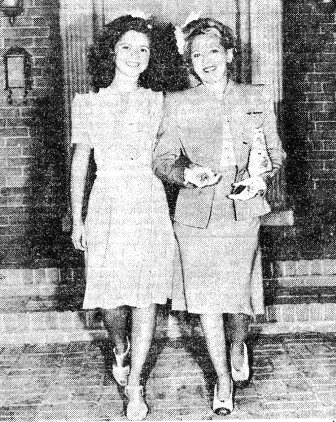 Shirley Temple, left, is quite the little lady now. She's 15 years old and some folks have noted a striking similarity
between her and Mary Pickford at the same age. And, say, isn't that Miss Pickford with Shirley? Dad-gummed if it ain't.
Shirley Temple, left, is quite the little lady now. She's 15 years old and some folks have noted a striking similarity
between her and Mary Pickford at the same age. And, say, isn't that Miss Pickford with Shirley? Dad-gummed if it ain't.
|
14th Air Force Smashes Japanese
From Burma to South China Sea
14TH AIR FORCE HQS. - Hitting the Japanese from East Central Burma and French-Indo China to the China Sea, the Tung Ting Lake area and Nampang Island, the 14th U.S. Air Force showered bombs on Jap installations, shipping, rail cars, villages and infantry and cavalry. Planes also made attacks on the Salween front in support of Chinese ground troops.
On Nov. 17 on the Salween front, fighter aircraft attacked a river ferry, inflicting many casualties. In the Western Yunnan Province, they attacked Jap installation at Pingka. Fighter-bombers also hit the Kengtung airdrome and barracks in East Central Burma.
The next day, fighter aircraft attacked the Tung Ting Lake area and along the Salween front in support of Chinese troop operations. They conducted a successful low-level attack on Japanese cavalry crossing the Lang Ho River. An estimated 60 men and 40 horses were killed.
Following this raid, Mitchell bombers swept over the South China Sea the next day, damaging two freighters totaling 1,800 tons. On another sweep along the Hainan Straits, they attacked two freighters, one of 2,450 tons and the other 1,550 tons.
Other B-25's, operating over the China Sea, attacked and sank a 150-foot gunboat, a 1,100-ton freighter and damaged a 2,450-ton cargo vessel.
On Nov. 20, Mitchell bombers, on a sea sweep off Nampang Island, intercepted and shot down one Jap transport and bombed warehouses and barracks on the island. Other B-25's, with fighter escort, bombed Jap installations at Tzeli.
Two AVG Pilots Join Comrades
CHINA - Lt. Cols. Tex Hill and George B. McMillan, former Flying Tigers who recently returned to China after service in the United States, swelled the list of AVG heroes serving with the 14th Air Force.
Maj. Bill Reed, who destroyed 10 Jap planes, commands a fighter squadron of the new Chinese-American Composite Wing. Lt. Col. John Williams, AVG communications officer, is at 14th Air Force Headquarters. Col. Tom Gentry, close friend of Maj. Gen. Claire L. Chennault, is still a medical officer, never having been home to the States on leave.
VETERANS SAY GOODBYE
COLORFUL A.S.C. COLONELS SHAKE DUST OF INDIA OFF BROGANS
WEST INDIA PORT - This month the CBI Theater's Air Service Command said goodbye to two of its most colorful figures as Cols. George E. Schaetzel and John M. des Islets shook the dust of India off their brogans to return to the United States for important new missions at Patterson Field, O.
Both men have been in the Theater almost since there has been one. Schaetzel came by way of the Philippines

|
"You might say one thing," said Schaetzel, "I'm the last of the 19th to go home except for those in Jap prisons and I'm almost willing to bet I was the first to get here."
In fact, because of a tour of duty in Hawaii before the war began, it has been four years since Schaetzel has seen the homeland. He left Honolulu, three months before Pearl Harbor, which was strictly an out-of-the-frying-pan-into-the-fire act. The Japs gave no encore at Pearl Harbor, but it was a 24-hour-a-day performance in the Philippines when Schaetzel and his comrades were making heroic attempts to strike back against overwhelming odds and in a hopeless battle.
Driven from the Philippines, the famous 19th jumped to Australia and then back to Java for another go at
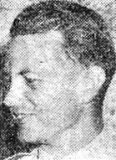
|
Des Islates arrived in the Theater almost two years ago. A West Point graduate, he had resigned to take up civilian engineering duties on such major jobs as the Bonneville and Mill Creek dams. But when war came, there was only one place for an Army Engineer - in uniform. Hacking out dams in America's "Wild West" was just the experience des Islets needed for hacking air fields out of C.B.I. jungles. When one base was completed, des Islets would move on to another, and now many of the most important bases of the ASC are monuments to his efficiency and drive.
In their new assignments at Patterson Field, both officers are fortunate - for they will be near their families. Des Islets' family lives at Dayton, O., and Schaetzel's wife and two children now reside at Mt. Healthy, O.
Old Malarky?
SECURITY MEASURES IMPORTANT TO WAR EFFORT
We ran into an interesting character the other day. he was a Regular Army officer of many years service, much
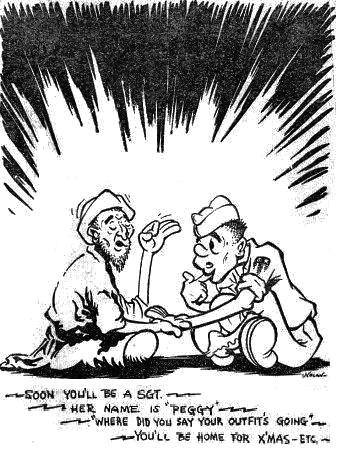
|
So, naturally, before long the conversation centered on such matters as espionage, counter-espionage, censorship, security measures and kindred subjects.
"Tell us," we finally said, "what about our own censorship regulations and security measures? Is there really any sense in them so far as this Theater is concerned, or is it just the old malarky?
"listen, Buster," this officer retorted, "this is the Theater in which we should be most careful. We're surrounded by millions of people here, and not all of them are friends of ours, by any means."
"It's difficult to convince our officers and men that small things make any difference," he continued. "They've seen too many movies. Their idea of espionage consists of a beautiful female vampire who lures the impressionable collar-ad officer into telling when the big offensive is going to start. From my own experience, I can tell you that it doesn't happen that way.
"For instance, I can tell you about a little matter that happened before the war, in the capital of a nation with whom we were still friendly, but which already was at war with other powers. American intelligence knew that a large-scale troop movement was about to take place, but we didn't know where it was going. Then, one day, in a crowded streetcar, one of our officers just happened to hear a woman say: 'I just got a letter from my son in the Army, and he's complaining that his new summer uniform doesn't fit him.'
"That's all. But in that area of operation, at that time of year, there was only one place where troops could be sent where they'd need summer uniforms. That's all we needed to know."
"Yes," we said, "but it would take a long time for information like that, even if it were in a G.I.'s letter home, to get back to Japan."
"Possibly," he admitted, "But letters sometimes get lost, half-finished letters are left lying around and the home folks letters back are thrown away. I don't doubt that, right at this minute, some buck-toothed s.o.b. in Tokyo is pouring over American letters, trying to figure out if the Brooklyn Dodgers is a code word for the umpteenth pursuit group or the blankety-blank truck company.
|
"And as for the loose talk that goes on, any foreign agent could pick up hundreds of valuable bits of information, just by getting himself a job as a sweeper, a bearer, a bar-walla, a tonga-walla or a fortune teller. This unit has recently got a lot of new men. That officer has been promoted and given a newly-created command. Certain new types of equipment are at last reaching the Theater. Replacement parts aren't moving as they should. Morale is lousy or terrific, as the case may be. And so on. Fortune tellers are particularly dangerous."
"What's the answer?" we asked, pretty much convinced.
"The best answer," he replied, "is, off the job, to have no mama, no poppa, no brother, no sister, no past, no present, no future. Even so, the Japs will find out plenty about us. But I'll be damned if I want to hand them anything on a platter."
The C.B.I. Roundup is a weekly newspaper published by and for the men of the United States Army Forces in China, Burma, and India, from news and pictures supplied by staff members, soldier correspondents, the United Press, and the War Department. The Roundup is published Friday of each week and is printed by The Statesman in New Delhi, India. Editorial matter should be sent directly to Lt. Floyd Walter, Rear Echelon Hq., U.S.A.F., C.B.I., New Delhi, and should arrive not later than Monday in order to make that week's issue. Pictures must arrive by Sunday and must be negatives or enlargements. Stories should contain full name and organization of sender.

NOVEMBER 26, 1943
Original issue from the collection of C.B.I. Roundup Correspondent Al Sager, shared by CBI veteran Dave Dale.
Copyright © 2006 Carl Warren Weidenburner
TOP OF PAGE PRINT THIS PAGE ABOUT THIS PAGE SEND COMMENTS
PREVIOUS ISSUE CLOSE THIS WINDOW NEXT ISSUE